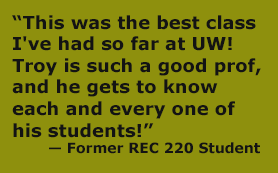 |
|
Troy Glover, Recreation and Leisure Studies |
Written by Sarah Forbes, Special Projects (Teaching Stories), CTE.
It would be hard to find a more authentic learning activity than the one students undertake in Dr. Troy Glover’s course in Program Management and Evaluation. In the course, Glover guides his students through a hands-on experience of designing and programming an actual day-long family event. The project has grown out of Glover’s background in children’s camping, a youthful experience that helped him realize that he wanted a career that allowed him to engage with people and acts as a mentor. In teaching he has found that path.
The annual event at the heart of Glover’s course is held at Waterloo's Stork Family YMCA and the Harper Library. Since it began in 2012, the event has grown larger every year, attracting more and more families. The students Glover teaches are in charge of every aspect of the event. Glover’s lectures are focused on learning principles that they can then apply to the real event that they’re planning. The challenge of this course, Glover says, is that the audience attending the event varies from year to year. “While students may plan for one age group or interest level, the actual group that comes for the programming might be very different. Adapting your original plan to the new audience is one of the real challenges of planning events.” As well, Glover says, the event is not just about giving families a fun time: each programming slot is designed to achieve a certain outcome, and the event as a whole is intended to build community. As the event grows every year, Glover can see the community growing.

Glover notices a similar growth in the students that he teaches. “Students come into my classroom with different talents and experience levels, and the most interesting part of teaching is how they grow throughout the term.” He gives the YMCA/Library event most of the credit for this development. When students see the outcome of their work in the experience of real people, they feel a sense of achievement that they wouldn’t get from an essay or exam.
While the YMCA/Library event takes students out into the Waterloo community, Glover has also developed another learning activity that brings to community to the students: he has YMCA staff members come to his classroom to present case studies on actual community programs that have not yet been evaluated. Working in teams, students analyze one of the case studies and put forward a proposal regarding it. The YMCA staff members select the best proposal, and the winning team has its name engraved on a much-coveted trophy humorously known as the "Grape Cup."
After teaching for many years, Glover says that his favourite part of teaching remains the rapport he can create with his students. He highlights the first lecture of the term as a time when he attempts to provoke his students into a large discussion. “I tend to be playful,” he says, “and I love it when they are playful back. It sets the stage for an enjoyable term for both of us.” Being in Glover’s course not only teaches students to plan an event in full, but to fully understand and enjoy the process of building a learning community. Zara Rafferty, one of Glover’s colleagues in Recreation and Leisure Studies, appreciates Glover’s approach, saying that she “admires Troy's commitment to community well-being, which is reflected both in his teaching and scholarship. His approach to teaching is innovative and immensely engaging.”
Read more Teaching Stories
More Resources
CTE has developed more than 100 Teaching Tips. Each one is a succinct document that conveys useful ideas and practical methods for effective teaching. Some of the Teaching Tips that are relevant to the strategies mentioned in this Teaching Story include the following:
Check out the Department of Recreation and Leisure Studies' article about Troy Glover's research on summer camp.